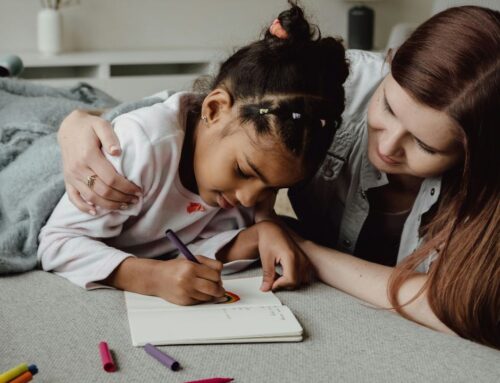If you’ve been on a home learning journey with your child, you may already know: success in learning can take many shapes.
In traditional school settings, success is often defined by test scores, grades, deadlines and the ability to memorize large amounts of information. But that’s just one way to view learning.
At SelfDesign, we believe that true learning success goes far beyond conventional benchmarks. It’s not just about what a learner knows, but how they engage with the world, connect with others and grow into themselves. Guided by curiosity, creativity and self-direction, learners follow individualized paths shaped by their interests and goals, and in doing so, they redefine what it means to succeed.
Here are just a few of the ways learning success shows up for SelfDesign learners:
1. Curiosity: The spark that fuels a lifelong love of learning
When learners are encouraged to follow their natural curiosity, learning comes alive. Curiosity opens the door to enthusiasm and self-motivation, a core marker of success.
Instead of being told what to learn, our learners ask questions, explore their interests and dive deeply into the topics that inspire them. Whether they’re studying the stars, writing a comic book or exploring how circuits work, they’re learning because they want to, not because they have to.
2. Critical thinking and problem-solving: Skills for life
Self-directed learning naturally encourages problem-solving. When learners choose their own paths, they also encounter their own challenges, whether it be confusion, frustration or obstacles to overcome. These moments are opportunities for growth.
At SelfDesign, learners are supported in thinking critically, analyzing situations and applying their knowledge in meaningful ways. They develop resilience and confidence by navigating these experiences themselves, with guidance and encouragement from parents/guardians and learning consultants along the way.
3. Communication: Expressing ideas in diverse, meaningful ways
Relationship-based learning is central to the SelfDesign model, and with it comes the development of strong communication skills.
Learners are regularly invited to share their thoughts, emotions and reflections, not only through conversation, but also through writing, art, storytelling or other forms of expression. These opportunities help build confidence in their voices and allow them to engage meaningfully with their learning consultants, families and communities.
4. Self-direction: Learning to set and achieve goals
At the heart of SelfDesign is the belief that learners thrive when they take ownership of their learning.
Whether setting intentions for the day or planning long-term goals, home learners are continually building skills in time management, self-motivation and responsibility. These are foundational life skills that prepare them not just for future academic paths, but for life beyond school.
SelfDesign learner Tristan Beaudry’s self-directed home learning path has allowed him to pursue his passion for wrestling at an elite level while staying on track with his education. He’s been able to train rigorously, compete across Canada and the U.S., and still manage his coursework in a way that fits his schedule, thanks to the flexibility and supportive relationships within the SelfDesign program.
“Tristen has been an incredible advocate for himself,” says SelfDesign vice principal Clarissa Tufts. “He found extremely supportive coaches in his community and was able to facilitate good communication with SelfDesign’s head coach, vice principal Vanessa Kuran. We’re proud of Tristen for being curious, pushing the boundaries to make this happen for himself and seeing the result of his hard work – he’s achieved some amazing accomplishments so far.”
5. Creativity and innovation: Building new pathways in the brain
Home learning encourages learners to explore ideas in ways that are meaningful to them. When curiosity meets hands-on experience, creativity naturally follows.
By making space for creative thinking and innovation, learners not only express themselves more fully, but they also strengthen neural pathways that support problem-solving, resilience and adaptability. These skills serve them well, no matter where life takes them.
6. Emotional intelligence: Learning through connection
Because relationships are at the centre of SelfDesign’s approach, emotional intelligence is a valuable result of the learning journey.
As learners work closely with learning consultants, family members and peers, they begin to develop a deeper understanding of themselves and others. They learn how to recognize and express their emotions, navigate social dynamics and cultivate empathy. These are skills that are just as important as any academic subject.
“SelfDesign is a global leader in the development of programs and initiatives that foster relationship-based personalized learning,” says SelfDesign Interim CEO Nikki Kenyon. “We have more than 20 years of experience in working remotely with learners across British Columbia and in building relationships of trust and authenticity with them.”
7. Real-world application: Taking learning beyond the page
Ultimately, learning success is measured not only in knowledge but in action.
When learners take the skills and insights gained through their SelfDesign journey and bring them into real-world settings such as jobs, relationships and communities… that’s where the learning truly comes to life.
John was a SelfDesign learner who launched his career in computer programming while still in high school. Starting in grade nine, he was hired by a major power sports company and eventually became their lead website developer. The flexibility of SelfDesign allowed him to balance his coursework with meaningful work experience.
“It’s just been pretty cool,” the Salmon Arm–based (now Abbotsford) learner says. “Not only through SelfDesign was I able to gain industry knowledge by just having the capacity to do schooling and doing work-related activities as well, they also combined in a lot of ways. A lot of the things I did within the sports company, I was able to submit to SelfDesign as personal projects and other learning artifacts.”
Redefining what it means to succeed
At SelfDesign, we celebrate success in all its forms. For some learners, it’s building a business. For others, it’s expressing themselves through art or discovering a passion for science. It might be learning how to communicate clearly, set personal goals, or simply waking up excited to learn each day.
These are the real markers of success; the ones that matter not only in school, but throughout life. And for families choosing the path of home learning, they’re a powerful reminder that learning is not a race to the finish line, but a lifelong journey of exploration, growth and connection.
Learn more about the SelfDesign learning philosophy here.







